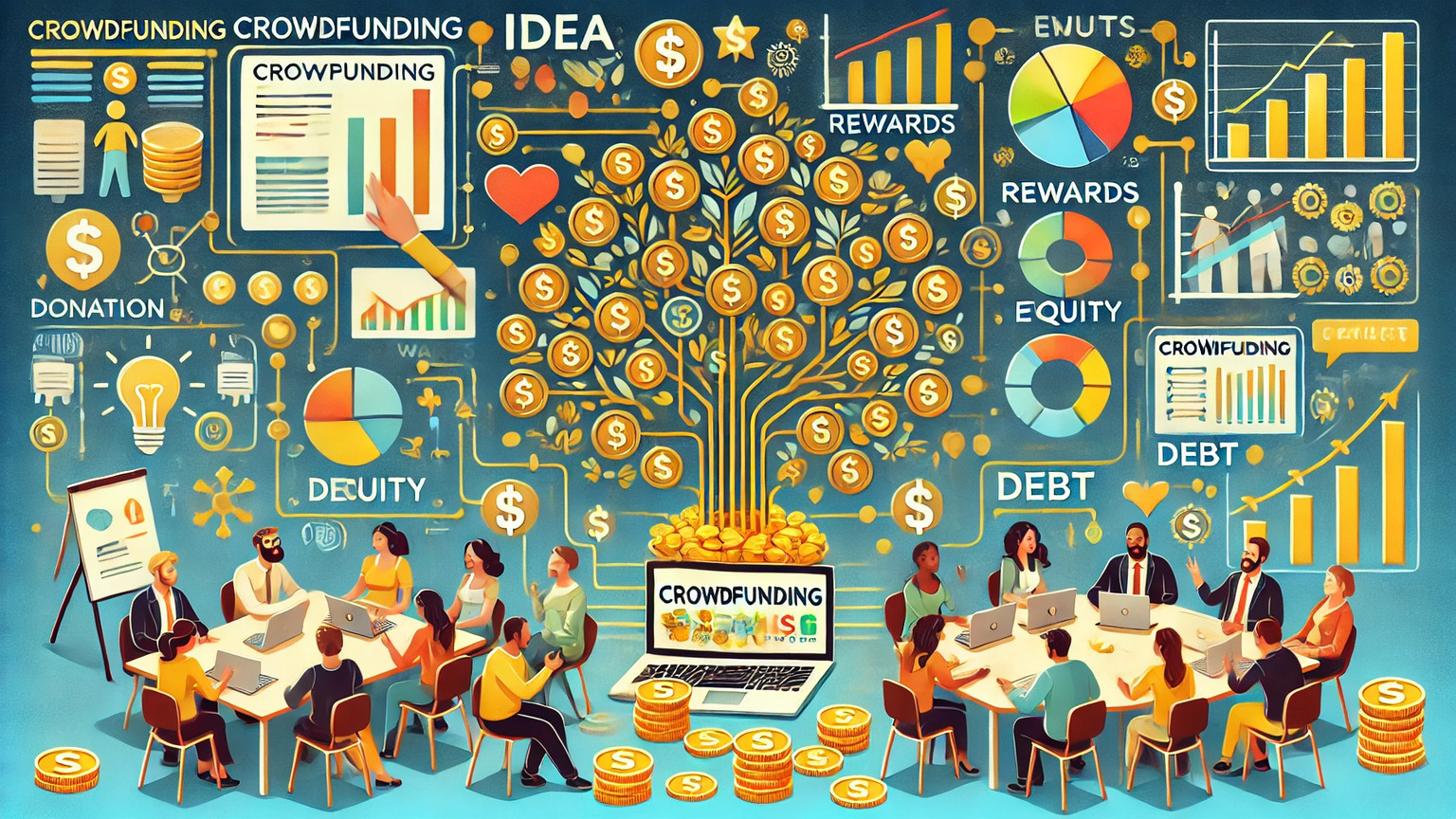Crowdfunding has emerged as a dynamic way to finance projects. It offers individuals and businesses a chance to raise money without traditional bank loans. This method brings together people who believe in a shared vision. Instead of relying on a single investor, funding comes from many contributors.
This approach has gained popularity for startups, creative ventures, and even personal causes. Platforms like Kickstarter and GoFundMe have revolutionized how people access money. Crowdfunding creates opportunities for those who struggle to secure funding elsewhere.
The Basics of Crowdfunding
Crowdfunding involves raising small amounts of money from a large number of people. These contributors typically use online platforms to support campaigns. Campaign creators pitch their ideas, and backers pledge funds in return. Sometimes, rewards or equity are offered in exchange for support.
There are four main types of crowdfunding:
- Donation-Based Crowdfunding: People contribute without expecting anything in return. This is often used for charity, medical expenses, or community projects.
- Rewards-Based Crowdfunding: Backers receive incentives such as products, services, or exclusive experiences. Creative projects like films or art campaigns often use this model.
- Equity Crowdfunding: Contributors become shareholders in the business they fund. This model is popular with startups looking for investors.
- Debt Crowdfunding: Also known as peer-to-peer lending, it allows borrowers to secure loans directly from individuals.
Each type serves unique purposes. Understanding which one suits your needs is essential.
Advantages of Crowdfunding
Crowdfunding provides more than financial support. It also builds connections between creators and their audience. Early supporters often become loyal advocates for the project.
Access to a broad network of people helps campaigns reach goals faster. The online nature of platforms makes them accessible to anyone, anywhere. This is especially beneficial for individuals or businesses with limited local resources.

Campaigns act as a test for market interest. Feedback from backers helps refine ideas before they officially launch. Businesses can use this input to strengthen their offerings.
Raising money through crowdfunding minimizes reliance on traditional loans. For many, this reduces financial stress and avoids high-interest rates.
Challenges and Risks
While crowdfunding offers exciting opportunities, challenges can arise. Running a successful campaign requires time and effort. Poor planning often leads to underwhelming results.
Competition among campaigns can be intense. Standing out on crowded platforms demands creativity and strategic promotion. Success isn’t guaranteed, even for well-thought-out projects.
There’s also a risk of not meeting funding targets. Some platforms follow an “all-or-nothing” model, meaning you receive funds only if your goal is fully met. This can be discouraging for creators.
Maintaining transparency with backers is crucial. Failing to deliver promised rewards can damage credibility. Building trust throughout the process is key to long-term success.
Tips for Launching a Crowdfunding Campaign
Preparation is the foundation of every successful crowdfunding effort. Research is vital before creating a campaign. Understand your audience and their interests to shape a compelling pitch.
Storytelling plays a major role in connecting with potential backers. Presenting the story behind your project helps build emotional engagement. Clear visuals and videos often increase the likelihood of contributions.
Setting a realistic funding goal ensures better chances of success. Goals should align with your project’s requirements and potential audience size. Overestimating can deter contributors, while underestimating may leave you short of necessary funds.

Consistency in communication is essential throughout the campaign. Regular updates keep supporters informed and engaged. Expressing gratitude for their contributions fosters goodwill.
Promotion outside the crowdfunding platform boosts visibility. Social media, email newsletters, and personal networks help reach a wider audience. Shareable content encourages backers to spread the word on your behalf.
The Impact of Crowdfunding on Society
Crowdfunding has transformed how ideas come to life. It allows individuals to pursue dreams without traditional gatekeepers. Communities rally together, turning collective support into real change.
Social causes benefit significantly from this funding method. People fund medical treatments, disaster relief, and education expenses with global support. Small businesses gain access to capital that might otherwise remain out of reach.
Creative industries have flourished thanks to crowdfunding. Independent artists, filmmakers, and designers now share their work directly with audiences. Contributors feel a sense of ownership in the projects they support.
Crowdfunding Success Stories
Countless success stories showcase the power of crowdfunding. Pebble, a smartwatch brand, raised over $10 million through Kickstarter. Oculus VR secured funds for its virtual reality headset before being acquired by Facebook.
Community-driven initiatives have also achieved remarkable results. Projects like building libraries, restoring landmarks, or supporting local entrepreneurs demonstrate crowdfunding’s potential.

These examples highlight the importance of a strong pitch and effective promotion. Campaigns that resonate emotionally tend to attract more backers.
Is Crowdfunding Right for You?
Deciding if crowdfunding suits your needs depends on several factors. Analyze the nature of your project and its appeal to a broader audience. Assess your ability to promote the campaign effectively.
Crowdfunding works well for innovative ideas and causes with emotional value. Projects requiring niche audiences may struggle on mainstream platforms. Exploring multiple platforms ensures you choose one aligned with your goals.
Having a clear plan for post-campaign delivery is vital. Whether you’re offering rewards or equity, delivering on promises strengthens trust. This trust lays the groundwork for future endeavors.
Future Trends in Crowdfunding
The crowdfunding landscape continues to evolve. Decentralized platforms using blockchain technology are gaining attention. These systems enhance transparency and reduce fees.
Niche crowdfunding platforms tailored to specific industries are emerging. They cater to sectors like gaming, sustainability, and education. This specialization improves the chances of connecting with target audiences.

Crowdfunding is also becoming a viable option for real estate investments. Individuals pool resources to fund property developments, democratizing access to the market.
Social media integration will likely become more seamless, making campaigns easier to share and promote. As technology advances, crowdfunding will adapt to meet new demands.
Take the First Step
Crowdfunding opens doors for innovative ideas and meaningful causes. It offers a chance to connect with supporters worldwide and bring dreams to reality. Preparing thoroughly and staying committed can make all the difference.
Explore crowdfunding as a solution to your financial challenges. Start your campaign today and unlock the power of community-driven support.
Ready to turn your idea into reality? Start building your campaign now and let the world back your dream!
Contact us today NOW!


